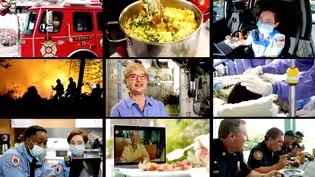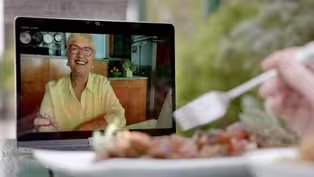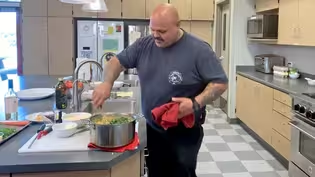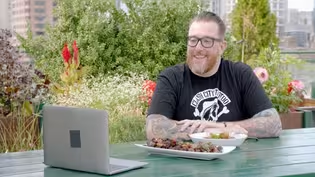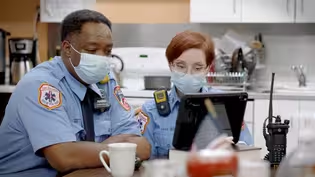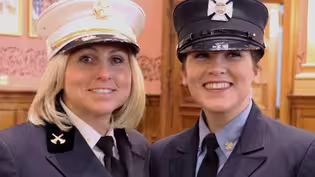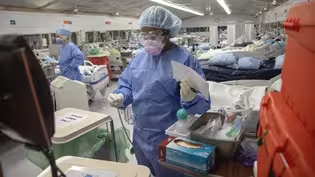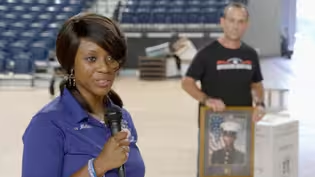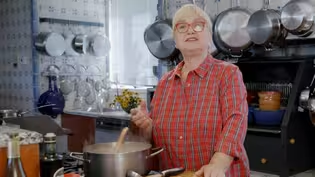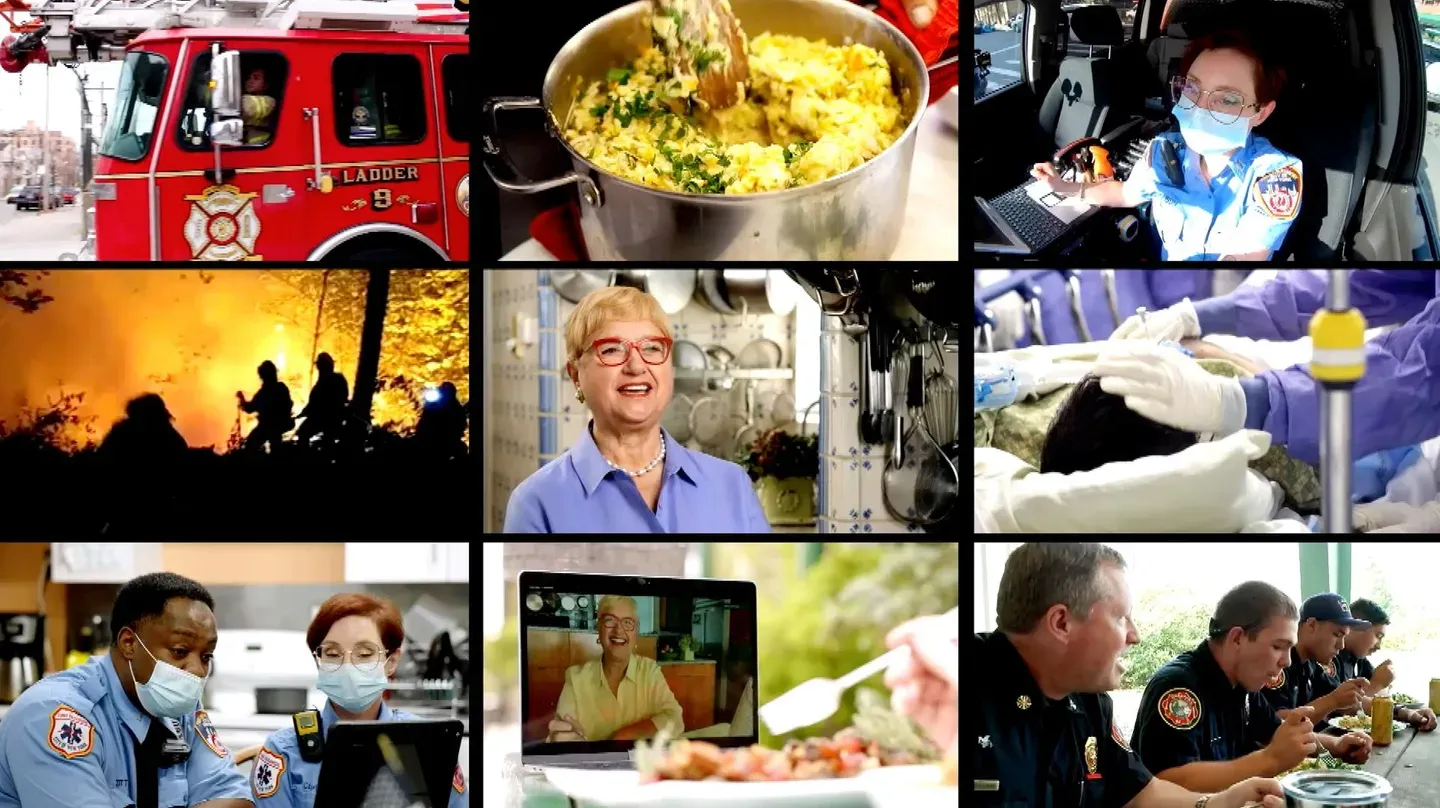
Lidia Celebrates America
Lidia Celebrates America: A Salute to First Responders
Season 2021 Episode 1 | 56m 20sVideo has Closed Captions
Lidia Bastianich visits men and women on the front lines during the COVID-19 pandemic.
Celebrity Chef Lidia Bastianich travels across the country visiting the men and women serving on the front lines, from firefighters in California battling wildfires, to medical workers fighting the coronavirus pandemic in New York. Lidia meets first responders who’ve worked quietly in the shadows, and now find themselves thrust into the spotlight by crises facing the country in 2020.
Problems playing video? | Closed Captioning Feedback
Problems playing video? | Closed Captioning Feedback
Funding for LIDIA CELEBRATES AMERICA is provided by the Corporation for Public Broadcasting.
Lidia Celebrates America
Lidia Celebrates America: A Salute to First Responders
Season 2021 Episode 1 | 56m 20sVideo has Closed Captions
Celebrity Chef Lidia Bastianich travels across the country visiting the men and women serving on the front lines, from firefighters in California battling wildfires, to medical workers fighting the coronavirus pandemic in New York. Lidia meets first responders who’ve worked quietly in the shadows, and now find themselves thrust into the spotlight by crises facing the country in 2020.
Problems playing video? | Closed Captioning Feedback
How to Watch Lidia Celebrates America
Lidia Celebrates America is available to stream on pbs.org and the free PBS App, available on iPhone, Apple TV, Android TV, Android smartphones, Amazon Fire TV, Amazon Fire Tablet, Roku, Samsung Smart TV, and Vizio.
Buy Now
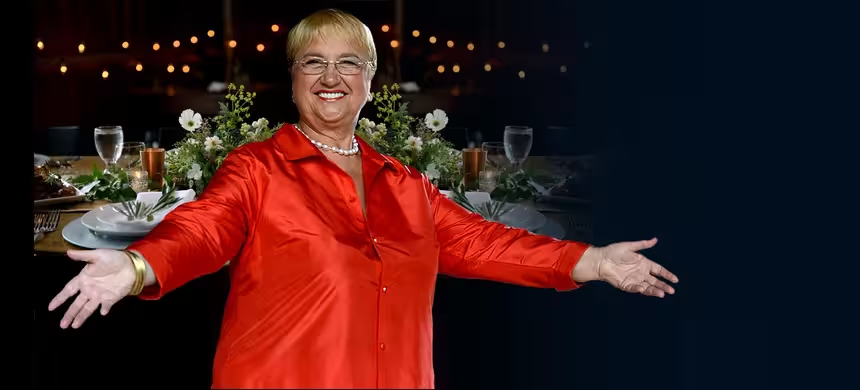
25 Years with Lidia: A Culinary Jubilee
Roll back the years and take an intimate look at the trajectory of Lidia's life both on and off the screen. Delve into her inspiring journey with engaging videos, and meet the remarkable woman whose legacy continues to shine.Providing Support for PBS.org
Learn Moreabout PBS online sponsorship♪ ♪ >> LIDIA: I'm Lidia Bastianich, and welcome to "Lidia Celebrates America."
For the past ten years, I've hit the road, sharing stories of people from all around the country.
>> Well, you can see here, the color of the barrel is already changing.
>> LIDIA: From artisans reviving a craft... >> We got Golden Delicious, Red Delicious, Honeycrisp.
>> LIDIA: To veterans finding new meaning through farming... What is for lunch today?
>> Chicken leg.
>> LIDIA: Chicken legs?
>> Yep.
>> LIDIA: To immigrants passing on their culinary traditions.
Okay, good luck to you.
>> Thank you so much.
(sirens wailing) >> LIDIA: But this year, the pandemic hit.
>> We were seeing just an insane amount of loss of life, hundreds of cardiac arrests a day.
(sirens wailing) >> Every single person tested positive for COVID at some point.
>> It's a dangerous job; I've had COVID now twice.
>> We have 16 positive... >> These people were the sickest of the sick, and every bed was full.
>> You thought, "My God, this is really bad."
>> LIDIA: Like many of you... >> Okay, so we're rolling.
>> LIDIA: I've been forced to stay home.
>> Lidia, if you can give us a clap.
>> LIDIA: But that has not gotten in the way of this year's journey... Buongiorno, Captain Ison and Lieutenant Scott.
>> (cheering) >> LIDIA: A celebration of America's first responders.
>> I find it more blessed to give than to receive.
>> Every nurse stepped up.
I want to help.
>> I trust the guys here enough to know that I'm going to come home.
>> My friends are in there-- there's nothing in the world I'd rather be doing than that.
>> No matter what happens, we're going to be there.
>> LIDIA: Join me as I drop in on them virtually.
Two sisters, two firewomen.
On a rooftop.
>> With the pandemic, we make do, right?
>> LIDIA: Absolutely.
In a hospital.
>> You can easily look back and see all of those patients.
>> LIDIA: In an ambulance.
>> We start right in the ambulance.
We don't wait till you get to the hospital.
>> LIDIA: And in a fire station.
>> It's literally your second home, your second family.
>> LIDIA: Since I'm not there, I want you to taste... >> It's cheesy, it's creamy, it's awesome!
>> Thanks, Lidia!
Appreciate it!
(all saying thanks) >> LIDIA: What a valiant job you guys have.
♪ ♪ It's a "Lidia Celebrates America" unlike any other.
>> Funding for "Lidia Celebrates America: A Salute to First Responders" was provided by the Corporation for Public Broadcasting.
♪ ♪ >> LIDIA: Ever since I was little, I've been taught the importance of supporting family and community.
My mother was there with me when I opened my first restaurant, and she helped take care of my young children as I followed my dream.
Now it's my turn to take care of her.
Hey, Grandma!
(speaking Italian) Oh, okay.
My mother-- we also call her Grandma-- has always lived with us in a sense.
She has helped me raise the children.
She would help to take care of the house while I worked.
And we had a little garden on the side, and as I worked in restaurants, she would do the planting, she would do the harvesting, and she would love to take care of the gardening.
(speaking Italian) She's now 99, and we are quarantined in a sense, and I'm taking care of her.
There's something about nature and growing food.
It gives you solace, it gives you stability.
It gives you an understanding of life.
So the garden for me now, even more, is very meaningful.
♪ ♪ As the garden bloomed this spring and well into the summer, I reached out, sharing our bounty with our neighbors.
The restaurants are closed where I could nurture, where I could feed my clients, but I fed my neighbors and nurtured my neighbors, and that gave me great satisfaction.
How you doing?
>> Honey, we're still here.
>> LIDIA: Okay, I left a little basket.
>> It's beautiful.
>> LIDIA: Now, more than ever, we really realize how important family is, our neighbors are, and our community is.
And you're 90?
>> Yes.
>> LIDIA: And he is... >> 94.
>> LIDIA: 94 and 90!
You guys look great.
When it really comes down to being isolated, the people immediately close to you are the people that will support you, that will sustain you, that will help you.
>> We've been doing beautifully, because you've been coming for over three months, with sauces, pastas, risotto.
>> It's beautiful.
>> These are the fruits of your labor.
>> LIDIA: Enjoy.
Bye, guys!
Have a nice lunch, and I'll see you later.
>> Okay, thanks, darling.
>> LIDIA: Okay.
>> Thank you.
(siren wailing in distance) >> LIDIA: By late spring, New York was considered Ground Zero for the coronavirus.
The streets were empty, but sirens were still heard all hours of the day.
(siren wailing) The pandemic has changed everything: how we live, how we interact, even how we make television.
I decided to make my first virtual stop nearby, at Holy Name Medical Center in Teaneck, New Jersey.
>> Okay, so we're rolling.
Lidia, if you can give us a clap.
>> LIDIA: In true pandemic fashion, I meet chief nursing officer Michele Acito and staff photographer Jeff Rhode on Zoom.
Hi, Michele.
Hi, Jeff.
What a pleasure talking to you.
You put your life on the line to take care of America.
>> You know, Lidia, it was an experience like no other, and hopefully one I never experience again.
When you're in a situation like this, the adrenaline is endless and you just keep going.
>> LIDIA: You and your team really gave not only medical assistance, but empathy, warmth, love.
You held the hands of people who had no one next to them.
>> Going into healthcare, everybody is compassionate.
It's part of our calling.
But especially during COVID-19, when there are no visitors, you are not only the caregiver, but you're also the stand-in family member.
>> LIDIA: And you, Jeff.
You could have stayed home, but yet you decided to be there in the front line and record it all.
>> I did have the option to not come to work, but I considered myself to be an essential employee, just like everybody else.
It was an obligation that I couldn't pass up to document the historical event that was unfolding right in front of us.
>> Okay, good morning, everyone.
So today, we have 17 patients.
We have 16 vents.
We have six DNR.
Everybody's positive... >> We did get that first patient, and then we had two patients.
In a week, we had 18 patients.
We knew we could not accommodate another ventilator patient in the emergency room.
We can't tell people, "Sorry, we're full."
We had to make every effort to accommodate every single patient.
♪ ♪ >> The hospital decided to build the temporary I.C.U.
space because our permanent I.C.U.
filled up very quickly.
>> When they started to plan this, it just seemed a little far-fetched.
(talking indistinctly) >> A wood structure inside of an unfinished storage space.
They had to put in oxygen, they had to put in suction, they had to put in plumbing.
It was a tremendous undertaking, and the team of people that did it just worked day and night, and they, they got it done.
>> LIDIA: They set up an I.C.U.
unit in five days-- everybody, from the janitor to the doctors.
And I just thought that that was so exemplary of what happened all over the United States.
>> When it was first built, it looked very white, very bright, very sterile, very empty.
(monitors beeping) And before you knew it, it was full.
And when you looked around that room, you thought, "My God, this is really-- this is really bad."
♪ ♪ >> These people were the sickest of the sick, and every bed was full.
Once a patient would leave and there was an empty bed, there'd be another patient.
And patients didn't always leave to go home, and it was tough to see day in and day out.
>> I'll be honest, every time I walk in here, I can still see people in these beds.
You know, especially, you know, people that were here for a long period of time.
(voice trembles): Excuse me, I'm so sorry.
(sniffs, clears throat) I can't think of all those patients.
>> LIDIA: That demands a lot out of you.
And on top of it all, you had three members of your family that you had to take care of while you were taking care of, of the whole ward there.
>> Having them here was a relief for me.
It was very important to be a part of their care, and more important, to be the connection to the rest of the family.
My mother-in-law turned 89 while she was here.
And it was really a very sweet event for her.
The staff sang "Happy Birthday" to her, and I was able to video that and FaceTime the family so they could share in that experience.
>> ♪ Happy birthday to you ♪ >> It was shortly after that that she died.
>> LIDIA: The pandemic really opened my eyes to the medical profession as first responders.
It really made me realize what these people are capable of doing and did in order to really save and protect their neighborhood.
Jeff, here you were recording pain, compassion, recording need.
>> When COVID-19 struck, my role changed, and I was now documenting everything that was going on inside the hospital.
(camera clicks) It was a much more intimate method of photography.
I was much closer with patients than I had ever been.
I was much closer with the staff than I had ever been.
>> LIDIA: Part of what Jeff began to document at Holy Name turned into a project he calls "Faces of the Front Lines."
>> I photographed employees that I came across and was talking to in their full PPE.
This was a way that we hadn't seen each other before.
♪ ♪ Staff got mixed up.
E.V.S., our environmental services people, they were wearing the scrubs.
I was wearing the scrubs.
And between that and the full PPE, you just didn't recognize everybody that you came across.
So people started to write on a piece of tape or across their face shield, they would write their name.
>> LIDIA: Of the thousands of photos Jeff took, there's one he still finds especially memorable.
>> This photo is of one of our colleagues, Jesus, that passed away from COVID while working here.
And it's of his director pushing his body from the I.C.U.
to bring him to the morgue.
The nurses that loved him for years were caring for him.
He'd always have a smile on his face, he'd always say hello.
♪ ♪ >> There were still alarms going off, you didn't even hear them.
All's you knew, you were in that moment, in that grief.
>> He got about a third of the way through this line of about 150 people, and one person started to clap.
>> (clapping) >> And then it just was contagious, and before you know it, everybody was applauding for him.
(applause) >> LIDIA: First responders know that there's a risk, and still, they continue, because they feel that they can make a difference, that they can save a life, that they can save many lives.
♪ ♪ One of the areas hit hard by coronavirus was the Bronx, where Captain Jennifer Ison is station chief for Emergency Medical Services.
>> Welcome to E.M.S.
Station 17.
This is the Highbridge section of the South Bronx, in Division 2, FDNY E.M.S.
Inside is our apparatus floor.
This is where we clean and restock the ambulances.
I absolutely love E.M.S.
I love helping people.
I love critical thinking, making decisions on my feet, and the things that we can do, even before we get to the hospital.
Hey, guys, good morning, how are we doing?
>> (responding) >> What are we doing, part-800-ing?
>> LIDIA: Captain Ison oversees a team of emergency medical technicians, paramedics, and lieutenants that are much more than a hospital transport service.
>> You're going to do the Clorox, we have that.
The positive static electricity cleaning.
We're not just driving you to the hospital.
We're bringing the emergency room to you.
We're doing pre-hospital care, and we're doing quality pre-hospital care.
>> We're just making sure that we have all the necessary resources so that whenever we have a call, we have literally everything we need.
You know, we have, like, an O.B.
kit just in case we need to do an emergency childbirth.
We have burn sheets, we have cold packs, and in case we need to do a splint and a swab.
>> E.M.S., you don't necessarily think about us until you need us.
You know, your worst day is, like, just a regular day at the office for us.
(siren blaring) I don't know if it's, like, an adrenaline rush or an egotistical thing, where you walk on scene and everything is chaotic, and I'm just, like, four-foot-ten of calm, you know?
And I wind up walking on scene and I'm six-foot-ten, and I'm, like, "You do this, you do this, you do this," and then everything runs smooth.
>> LIDIA: I met Captain Ison just after she'd been promoted to station captain.
>> We were the COVID captains, there were seven of us who got promoted, socially distanced.
I run the show-- I make sure everybody gets paid, I make sure everybody's doing the right thing...
I'm the boss.
(laughs) >> LIDIA: Such a young woman.
How did you get into, into this vocation?
>> So, it's a little embarrassing for me, but I am a legacy.
My parents actually met in Glen Oaks Volunteer Ambulance Corps in Queens, and they were both E.M.Ts.
And then I just grew up around helping people.
My mom was a captain before she retired.
My dad is currently, I think he's number two in the city, of seniority.
He's got about 41 years, and he's a division chief of Brooklyn.
>> LIDIA: Wow, what a family.
What a proud family it should be, indeed.
And romance in the ambulance.
Who knew, huh?
>> Exactly.
Exactly.
>> LIDIA: Within a family, if we have a passion as parents, as grandparents, we can pass that on and we can influence our next, the next generation or the generation thereafter.
How about you, Lieutenant Scott?
What drives you every day?
>> Sometimes my doorbell get ringed a lot, because people come to me and say, "Listen," you know, "so and so is having trouble breathing."
They know I'm going to hurry up and rush and come and help.
>> LIDIA: That's wonderful.
Do you spend time also with young people?
Sometimes they're wondering about, what are they going to do in life?
>> Tell them about your neighbor.
>> Yes, yes.
A lot of fathers come and thank me, because on my block, you know, when I see, like, a teenager that's 16, 17 years old, I ask them, you know, "What are you going to do with your life?"
You know, and I would try to give them the roadmap to become an E.M.S.
1-7-Charlie's 98 for 33 minutes.
>> Not bad, not bad.
>> Being an E.M.T.
makes you a different kind of person, because it makes you a team leader, it makes you think on your feet.
You have to have that kind of mind to help somebody who's helpless.
>> LIDIA: Being an immigrant and being for two years in a refugee camp, I was aided and helped by people who cared, by people who wanted to make life better for somebody else.
Working on this show and meeting these first responders really affected me deeply.
With the COVID pandemic, how has your risk increased and how are you handling it?
>> This was nothing that we've ever imagined or could have imagined that we were going to have to deal with in our career.
And we were just-- every day, just loss of life and... We really came together.
♪ ♪ >> LIDIA: Do you get gifts of appreciation?
>> Every restaurant, like, on the planet was sending us food every day-- there was not a single person who went hungry.
Every tour, every shift, every member had food.
They were bringing Lysol, Tylenol.
What else?
Those face shields, you know, like, the plastic face shields.
It was just incredible, it really was.
>> LIDIA: What kind of person does give of themselves?
I think there's a common denominator there, and that is the need to nurture people, whether you cook for them and feed them, or whether you're with them in the frontline.
There's a common denominator of wanting to do good, to give back to society in some form.
♪ ♪ Next, I meet former chef Jacob Mual-- now an E.M.T.
and firefighter in California who wants to give his fellow first responders the gift of nourishment.
>> Good morning, Lidia, how are you?
>> LIDIA: Hi, Jacob, how are you doing?
>> I'm doing well, thanks.
>> LIDIA: I'd love to be there with you, and usually I am.
But here you are, chef, and you go from one fire to the other fire.
>> (chuckles) >> LIDIA: You kind of combined your two passions, didn't you?
>> Yeah, yeah, a little bit, a little bit.
>> LIDIA: What made you decide to sort of go into firefighting, or be a first responder?
>> A lot of it, my daughter.
I tear up on that part, sorry.
She'll actually be five this year-- that's the biggest part of it, you know, and it just kind of has slowly but surely morphed into, like, doing it, leaving restaurants on a full-time basis... >> LIDIA: He was a chef.
He loved being a chef, he loved cooking.
But he felt that, you know, he had this need and a calling to really be out there and help people, and he became a volunteer firefighter.
♪ ♪ >> 300 fires burning in California.
Nearly 7,000 firefighters are on the frontlines... >> LIDIA: Right before our call, he and his team had been battling the wildfires of North California.
(thunder claps) >> In the course of 24 hours, lightning struck the ground 400-something times and started a fire.
There were so many new starts that they were just naming them numbers.
And some of these fires were small little spot fires that you ran over to with a garden hose and put it out.
Some of these fires got unchecked, and next thing you know, there are 3,000 acres on fire.
The winds kept shifting on us.
Everybody was having a tough time with that fire.
There was a fire down in Marin County that we just saw.
I heard their navigation got a little twisted around, the fire started encroaching on them.
It was dark.
Definitely a little stressful.
(helicopter approaching) So the sheriff's helicopter had to go in with a guy on a long line and kind of pull these guys off this hilltop.
>> All right, guys, I'm gonna get you out of here, okay?
Feel how close it is, guys?
>> Yeah.
Thank you for coming.
>> Yeah, man.
♪ ♪ >> It kind of ramped up and just happened quicker than anybody expected.
Nice job...
So all the fires were just kind of across the ridge over there.
On a clearer day, you could see more of it, but there was smoke columns over here, kind of right in the center, and then you could see ones further over there.
We had one engine over on Sweetwater Springs.
It kind of popped between Sweetwater Springs and Healdsburg, just doing structure protection, stuff like that, because the fire was kind of pushing through there.
And then my engine got put over in Armstrong Woods.
With my daughter and kind of the decision to become a volunteer, a first responder, it was just something she could look up to.
That was a big thing for me.
>> LIDIA: Though proud to be a first responder, Jacob hasn't given up his passion for cooking.
He's writing a cookbook called "Functional Food for First Responders."
He asked me if I'd contribute a recipe.
You know, I picked a recipe, I hope you like it.
Riso alla pitocca, which is rice, everybody loves rice.
And this recipe is a one-pot recipe.
>> I'm really excited because a lot of the guys, one of the things that a lot of the guys have asked for is risotto.
(laughs) So I'm really excited that it's a rice dish.
They're going to love it.
>> LIDIA: So Jacob, the first step, I guess, is making a pestata.
I do it in a food processor.
You have one there, yeah, I see.
>> I do, yes, absolutely.
>> LIDIA: We can talk and cook, Jacob, no?
>> (laughs) ♪ ♪ >> LIDIA: You know, the old times, my grandmother, we used to chop it with a knife, you know, little pieces, and you would chop it with the knife.
And tick, tick, tick, tick, I hear for hours in the kitchen going on.
>> (laughs) >> LIDIA: But here with a food processor, it's an easy, an easy step.
Garlic, you're going to put garlic in there?
>> Yep, so we have the celery, the onions, the carrots.
(processor whirring) >> When I started coming here, everybody just automatically was, like, "Hey, man, can you help me out with a recipe?
Hey, man, can you help me out with a recipe?"
Young guys that were going off to work that just didn't know what to cook, didn't really know how to cook.
That was when the idea was kind of spawned to, like, to put this book together.
>> LIDIA: So now you have the pestata.
And you're gonna put some oil first, some olive oil?
>> Yes.
So, Lidia, do you let the pot get hot?
Do you want to sauté the vegetables or do you want to get them in and start sweating them?
>> LIDIA: No, you can just start sweating them right away.
>> Okay.
>> LIDIA: You know, olive oil is sensitive to heat, so I never overheat it.
>> Okay.
>> LIDIA: You know, I put in things, and then they get sort of heated up together.
>> Okay.
>> LIDIA: So when we were talking with Jacob about a recipe for his book, I had to keep the criteria that he started out with in mind: straightforward, simple, possibly a one-pot meal, and something that everybody like.
Jacob, tell me, do most firehouses have a nice kitchen like this?
>> Cooking just being such an important part, you know, in the culture, they definitely do.
You'll go into some older firehouses and you can tell they're definitely a little bit older, but, like I said, cooking is definitely something that is very important in the fire service.
So you'll find a pretty good kitchen in most firehouses.
You know, even if they're a little older and a little smaller, they're definitely going to be stocked with a lot of stuff.
>> Everybody takes turns cooking, like, pretty much on a shift, but, you know, when it's their turn to cook, they cook three meals.
They cook breakfast, lunch, and dinner for the whole crew.
>> LIDIA: Jacob shared with me his passion for cooking, but also what he really came to realize is the need of food for physical strength and emotional sustenance, if you will, to these first-line responders.
>> So I'm getting ready to add the rice and the stock now.
So the chicken cooked all the way down.
>> LIDIA: Okay.
>> Four cups of rice.
>> LIDIA: Mm-hmm.
I can't help but be in awe of our first responders.
Every time you go out there, your life is on the line.
You don't know whether you're going to come back.
Do you ever think about that?
Does it ever stop you in any way?
>> No.
You know, I have a daughter.
So I think about my daughter all the time.
That's, that's my biggest thing.
Does it make me not want to do it or does it scare me enough to not go?
No, not at all.
Because...
I trust the people that I'm with enough, you know?
The guys that I'm here with are, they're really good at what they do.
So I don't think that that would ever be a thing.
And maybe that's just, you know...
There is an inherent risk.
There's totally an inherent risk, but I trust the guys here enough to, to know that... (tearing up): That I'm going to come home, so... >> LIDIA: That's, that's great, it's the trust and the need and the knowledge of each one of you supporting each other and ultimately keeping us all alive.
>> Totally, totally.
>> LIDIA: Jacob felt that he needed to make the world that his daughter's going to grow up in a bit better.
So he evolved in becoming this volunteer firefighter and then combining his two passions.
Cooking is a way of nurturing his team, of giving of what he knows well, how to cook good food that will make them feel good, bind them as a team, but also nourish them physically.
>> LIDIA: So, Jacob, how are we there?
Where are we?
>> It's looking good.
I just have to add the butter, the cheese, and the parsley to finish it up, and then we're ready to go.
♪ ♪ >> LIDIA: You're like me with cheese.
A handful of cheese goes in there, huh?
>> (laughs) >> LIDIA: That's it.
♪ ♪ >> All right.
>> LIDIA: Parsley the last minute, okay.
Now when you're finished, really mix it in well.
I want you to scoop yourself out a nice scoop.
>> All right.
>> LIDIA: And since I'm not there, I want you to taste and give me an honest opinion how you like it, if it misses anything, and how do you think your team there will react to this?
>> (laughs): I think it's awesome.
It's awesome.
It's cheesy, it's creamy.
>> LIDIA: It's good!
>> It's awesome, I love it.
>> LIDIA: You think that your team, your whole team will love it?
>> I do, I do.
Lidia, I'm pretty sure they're going to kick me out and offer you a job next.
>> LIDIA: All right, all right, so one more for your book.
Listen, I want reports from you.
I want to know how they react to it, how they like it, and if this makes it on the regular firehouse menu, okay, Jacob?
>> Absolutely, absolutely.
I'll let you know what they say.
>> LIDIA: Give them all my best and buon appetito.
>> Thank you, Lidia.
♪ ♪ So after the guys come in on their 24-hour shift, it just, it feels good to be able to provide them with a home-cooked meal.
♪ ♪ Something that has some substance, that warms them up a little bit, so it just, it feels nice to be able to give that to them.
>> Delicious >> Great.
>> Can't wait to have more, that was pretty good.
I liked it a lot.
>> LIDIA: This meeting brought back all those memories of what a difference when people care really makes to other people, how much we need each other, how much it is necessary for us to communicate and to understand, and to be there for each other and to give of ourself whenever we can.
♪ ♪ ♪ ♪ >> LIDIA: In New Jersey, sisters Connie and Francesca Zappella introduce me to life as a firewoman.
>> You're gonna get wet.
>> LIDIA: So, here we are, Jersey City Fire Department, Engine 15, two sisters, two firewomen.
And let me tell you, firewomen is not an easy word to say, because there are not many women in the fire department, are there?
>> Jersey City has a large department of close to 700 members, 26 companies.
And of those members, in the last 150 years of the department's history, we have 12 women.
>> My sister, she's not just a female firefighter.
She actually was the first female firefighter in Jersey City, and the first female captain in Jersey City, and the first female battalion chief in Jersey City.
>> (laughs) >> She's making it really hard for me to, you know, live up to her, but, yeah.
She definitely was a role model for me.
>> LIDIA: That's wonderful, Connie, congratulations on all those firsts.
>> Thank you.
>> LIDIA: Being a woman, it's not always the easiest to break into a profession.
You know, me as a chef, I had my hurdles, but, you know, I just loved what I did.
And I went on and I did it with passion, and I saw these women do the same thing.
>> I did well in school, and I thought I was going to be a corporate superstar.
Hey, Pete, how are you?
>> Connie!
>> Hey, how are you?
>> Hello, my love.
>> We have a big order for Ladder 9.
>> Yes, we do, we got it all here, coming for you, my special people.
>> But once I was in the corporate world, I realized that I had a calling to help people and to be active, and I preferred to be involved in my community and give back.
>> Thank you, chief.
>> Thank you, same to you.
>> LIDIA: Now, you know, being a firewoman means going out there and means helping people in need.
And with this situation that we have now, you both are COVID recuperees, shall we say?
>> We run into burning buildings while everyone else is running out.
I think COVID's the least of my worries.
I actually missed coming to work.
I know people hate going to work usually, but I missed coming here and hanging out with the guys.
>> She would wake me up at midnight so that we could go onto a website to go get tested the next day.
>> You have to schedule it, and the new appointments come out at midnight.
And if you don't schedule it at midnight, all the appointments are taken.
>> We just wanted to get our negative tests.
We needed two negatives to come back, and it was, like, okay, get on before all this, you know, appointments book up.
>> When did you start on the line?
>> The 24th, I think?
>> It's at the discretion of the chief where he wants to place you... >> LIDIA: They can't wait to go back.
They know that there's a risk.
And still, they can't stay away from it because they feel that they can make a difference.
(alarm blaring) >> Oh, they got a call.
>> They're going out.
♪ ♪ >> When the tones go off, you get dressed as fast as you can and you get out the door because you don't know what's going on.
(radio chatter, siren blaring) When you hear "smoke reported" or "fire reported," "smoke in the area," your adrenaline's, like, to the roof.
(radio chatter, siren blaring) (radio chirps) >> Received, 15... Having been the first female in Jersey City, it was a big shock to everybody, so I had to literally be accepted by a 700-member male department as their first female.
(camera clicks) In the beginning, I would say that was probably the hardest, because I was changing the entire department, everything about it.
Right down to how men talked, how they dressed, how they did everything.
♪ ♪ They can't tell we're women when we're in a fire or we have our gear on.
It's when we come out of the fire and rip our helmet off.
And it's the best when, like, we're the person putting the fire out, and you come out and you take it, and they're, like, "Oh, my God, that's a female!"
Like, "Yeah."
(laughs) Nice to meet you.
See you later.
(radio chirps) Dispatch to FTO...
I think one of the reasons why we are both strong, independent women is because our father passed away of cancer when we were children.
Actually, Francesca was a month old.
So we watched our mother, who was a strong, independent woman, raise us and work, and she had five young children to take care of.
>> LIDIA: So when you decided, this is 18 years ago, to become a firewoman, what did your mother say?
>> Her words, and I remember them till today, were, "Why would you want to be a firefighter?
Any idiot could be a firefighter."
And I know today she would take those words back, because she knows it's not true.
She knows how demanding our jobs are and how much I've studied to be a chief and get promoted.
>> LIDIA: And I'm sure she's very proud of you today.
How about you, Francesca?
>> Before this, I was a police officer for Jersey City, so I went from one scary job to the next, and she's, she's never going to be okay with it.
She's scared for both of us all the time.
She thinks it's crazy that we run into buildings that are on fire.
Like, who does that?
(laughs) >> LIDIA: That's a mother's thought.
>> I used to explain it to my mother, because she's always been, you know, afraid for us, that we don't even think about the fear factor of it because we know we're safe.
>> LIDIA: So it's a real team.
>> The second fire, I believe, I went to, I came out of it and I saw Connie's face and I've never been so relieved in my life to see her.
And it's very comforting knowing that she's going to be there always.
>> LIDIA: Women really play an important model role in these kind of tough positions.
That sends the message, "Yes," you know?
"I can become that," to other women.
>> Guess what, you're on watch today.
>> (laughs) >> As long as you're able to pull your own weight and do everything just like the guys, they all accept you just like you're one of the guys.
Every single thing that you do, you're relying on someone in your house to help you.
You have to trust them and you have to work together.
And you spend 24 hours with them, so you learn a lot about them.
It's literally your second home, your second family.
(indistinct chatter) (train horn blows) >> LIDIA: From Jersey City, I return to New York to visit with Eddie McNamara, a former police officer.
>> When I became a cop, I thought this could be something where I did something that maybe mattered.
You know, like, I could maybe, like, be that guy sitting at the end of the bar, like, be, like, "All right, I did something with my life."
(radio chatter) >> LIDIA: Eddie was 25 years old when the World Trade Center was attacked on September 11, 2001.
>> In the beginning, everyone was doing sort of what we believed to be search and rescue.
We believed that maybe there's a pocket down there, and that's where a bunch of people are, and they've gathered.
And, you know, things like that you have to tell yourself in order to keep doing this job.
And so you're doing, you're doing recovery with the hope of... rescue.
>> LIDIA: It turned out that there were no more rescues.
Eddie spent the next four months working on recovery of those who had not survived.
>> One of the things that really got me was, I took a wallet out to I.D.
someone, and I saw a picture of them and their family smiling, and it just broke me.
Um, I, you know, I couldn't stop thinking about it.
I couldn't stop thinking about how this person just went into work and... You know, this, like, sort of, like, idealized family photo, and, like, there's no way that, you know, three of the four people in that photo are happy anymore, you know?
It's just... it just...
I couldn't stop thinking about it.
>> LIDIA: The trauma of working the World Trade Center site led to a diagnosis of PTSD and panic disorder, ending Eddie's career as a police officer.
>> PTSD for me is, I feel that things are very dangerous when they're not dangerous at all.
Just simple things like crossing the street, and I don't know why, but it feels dangerous to me.
♪ ♪ >> LIDIA: But he eventually found cooking, which provided him with a new sense of purpose.
With food, it's a way of giving some sustenance, emotional and physical, to the people that you cook for.
So he found another way to channel his caring and his wanting to help.
>> I need, like, say, like, two big eggplant.
That's a good size.
I think it helps in the moment.
When you're cooking, if I'm chopping, I am just focusing on the chopping.
Two heads broccoli, please.
I'm not thinking about everything going wrong in my life.
I'm not thinking about events from the past that are very unpleasant to think about.
Have a great day.
Thank you.
I'm thinking about chopping a pepper.
>> LIDIA: He offered to cook me a few of his favorite dishes.
Hi, Eddie.
Eddie McNamara, how are you doing?
>> I'm doing great, Lidia.
Thank you for doing this with me.
>> LIDIA: Oh, love it, love it.
I want to hear your story.
You were first a Port Authority cop.
Then, on the first line at the 9/11 site.
And now you're a chef.
>> You know, I was retired from the police department around, around 30 years old.
And I... you know, I needed a second act.
So I liked cooking.
My wife signed me up for cooking classes.
I went to culinary school and started doing private chefing and some recipe testing for a bunch of magazines, and started writing my own recipes, and a publisher emailed me and says, "Do you want to do a cookbook?"
So, it's kind of an unconventional story how I got here, but here I am.
>> LIDIA: Eddie, what are we making here?
What are you going to cook for us as a chef?
>> What I'm doing today is eggplant and broccoli veggie balls.
They're very spicy, they're very flavorful.
>> LIDIA: All right.
That's nice.
I'm looking forward to it.
And you actually sent me some of these... >> I did, and, and my heart's doing this.
My heart's doing this right now.
(Lidia laughs) I can't wait to find out what you think about it.
If you like it, I take credit.
If you don't like it, it's the delivery guy whose fault it is.
(Lidia laughs) >> LIDIA: I think I'm going to like it very much.
How are you going to start?
>> I'm going to start with broccoli.
And that's going to be part of the base of my, of my meatballs.
A lot of moms who read my cooking blog wanted a way to get vegetables to their kids.
I tricked them with a meatball.
You could serve it with spaghetti and kids like it.
>> LIDIA: Food is a way of reaching people, comforting people, nurturing people in a much calmer way, which was congenial to his personality.
What I love about your book, you're really straightforward.
You're even funny at times.
The broccoli, the florets, don't waste the stems.
>> I hear my grandmother's voice, you know, "Make something with it.
"Make a slaw.
Don't waste... we don't waste food here."
>> LIDIA: As Eddie cooked, we talked more about his experience at Ground Zero.
To be right in the middle of it, to have...
It must've been still... still smoldering, smoking.
>> It was still smoking.
It was a wild thing down there.
One time my boots melted.
I was standing on a piece of steel.
The rubber on my boots was melting.
♪ ♪ But, at that time, you're not thinking about that because my department lost 37 people.
You know, four or five people from my high school were lost in the Trade Center.
Every New Yorker knows a lot of people.
So our job is to look for them.
And, at the time, that felt like the most important job in the world.
>> LIDIA: In retrospect, do you have a feeling of, "I helped somebody.
"I...I did what I wanted.
I wanted to be there of service."
Does that come through your mind still?
>> It has to.
That's a really interesting and tough question, because, you know, I... you know, from what happened afterwards-- you know, post-traumatic stress disorder and panic attacks-- part of me says, "Oh, I wish I never was there."
But at the time, I'm 25 years old, this thing just happened, my friends are in there.
There's nothing in the world I'd rather be doing than that.
I don't talk about that much, so I never say it that way.
But I do feel like I was something... part of something important.
>> LIDIA: I guess the cause is greater than the pain.
>> It's bigger than you.
So, you know, I'm part of this machine that's, that's helping.
And I, you know, I'm proud of the work I did there.
And, you know, I'm really proud of the people I worked with.
So I got the broccoli.
It's going to go for a few more seconds, then I'm going to pull that out.
It has that... that green color, like the broccoli you get in a Chinese restaurant, and that's when I know it's ready.
>> LIDIA: Okay, okay, are you going to chop all that up?
You're gonna chop it up?
>> Yeah.
I'm going to mince it up.
>> LIDIA: Are you going to use a processor, or are you going to do it by hand?
>> Now, normally, I would-- being that we're on the roof right now, I'm going to do it by hand.
>> LIDIA: So you're on the roof.
This looks nice.
>> I am on the roof, yeah.
We're... you know, with the pandemic, we make do, right?
♪ ♪ I'm going to start adding the spices.
A tablespoon of adobo.
It's an all-purpose spice.
It's salt, and oregano, and pepper.
We're also going to do a teaspoon of smoked paprika.
I love this.
It's my favorite spice.
And then we're going to go with cumin.
We're going to... we're going to punch this flavor up a lot.
We're going to do two teaspoons of cumin.
And then, finally, we're going to make it a little spicy.
I like sriracha, so I'm going to do two teaspoons of this.
So one heaping spoon... to the hand...
Roll it around a little bit... And I bake these instead of frying them.
>> LIDIA: I noticed you sent me some sauce, too.
You make a tomato sauce with it?
>> Yes, and this is, like, I feel like this is a physicist sending Albert Einstein their version of the Theory of Relativity.
So I want you to like this so much.
>> LIDIA: Yeah, no, no, it all smells good.
Let me tell you, I have it reheating now, and I'm going to taste it in front of you and tell you.
Food is a very special segment of our industries, if you will, because, yes, it's job, it's work, you can make money with it, but it goes deeper than that.
It really goes feeding somebody and nurturing and expressing that you care for them.
Eddie, I see you have a nice spread in front of you.
And thanks to you... >> Yeah.
>> LIDIA: ...I have a nice spread in front of me.
I have your meatballs, I have your Brussels sprouts with pecans, with grapes.
You know what?
It looks... it looks like a comfort meal, and yet, you know, it's all vegetables.
So let's taste.
>> Let's go.
>> LIDIA: Okay.
That's it.
I did it with my hand.
>> Me, too.
I did it with my hand, too.
>> LIDIA: Okay.
Should we dunk it?
>> Sure.
>> LIDIA: Okay.
And okay, let's taste.
>> Yup.
♪ ♪ >> LIDIA: Very good, Eddie.
I love the sauce.
The sauce is good.
There's a little sweetness, a lot of onions, right?
>> Yeah, a lot of onions, and honey.
>> LIDIA: Mm.
Really good.
Now the Brussels sprouts.
You know, I happen to love Brussels sprouts.
You gave them kind of a... What did you say about this-- the most disliked vegetable?
>> Got to be.
Everybody has a story about how their mother just boiled Brussels sprouts, put a little butter on it, and gave it to them as a kid.
And then you just... you spit it in the napkin, stick it in your pocket, and you don't want to eat it.
And I wanted to make that my mission to... to improve the reputation of Brussels sprouts.
>> LIDIA: Okay, let's taste.
I'm going to go for a Brussels sprout now.
Mm!
Delicious.
And it's cooked throughout, nice and mellow.
That's the roasting, right?
>> So I roasted it for 45 minutes even.
>> LIDIA: Eddie, this is some good food, good stuff.
I'm very, very proud of you.
>> I appreciate that so much.
Thank you.
Thank you so much.
>> LIDIA: The price Eddie paid for his service touched me deeply.
I decided to look for opportunities to thank some of our first responders.
♪ ♪ In Washington, D.C., I reached out to U.S. Army veteran Jenine Melton.
She's volunteering for Operation Gratitude, a non-profit that has been sending care packages to our military men and women since 2003.
>> Hey!
>> Hi!
>> So glad you're here!
>> (laughing) >> Awesome!
>> Yes!
>> Okay, so, we'll need you to check in.
>> Yes, ma'am.
Okay, Operation Gratitude... All right.
>> And then you'll go to today's date and register there.
Yup.
>> Okay, wonderful.
>> LIDIA: Over the years, they've expanded their mission.
They now send care packages to frontline workers in the United States.
>> Operation Gratitude is all about building community.
>> LIDIA: The thousands of packages assembled today will be delivered to fire, police, and E.M.S.
units who, like Eddie, responded to the September 11 terrorist attacks.
>> What you're part of today is honoring the memories of the people who fell in New York, Shanksville, Pennsylvania, and right here in Washington, D.C. We have Jenine, who I'm gonna call up real quickly.
>> I find it more blessed to give than to receive.
>> I'm gonna get choked up.
>> That's okay.
That's okay.
>> Um... Jenine lost her brother 12 years ago.
Today is the anniversary of Jesse's death.
>> So my brother was 18 months older than myself.
We were very close, him and I.
He put others before his self all the time, without a question.
And as I watched his example, I said, "I want to be just like my brother."
Today is the 12-year anniversary of my brother's passing.
He made the ultimate sacrifice to our nation, along with two other service members, and I would like to say their names, as well, First Lieutenant Nicholas Madrazo and Corpsman Eichmann Strickland, and there was also an Afghan interpreter that was with them at the time.
So please keep their family in your prayers.
♪ ♪ And I remember when my mother called me, and I said, "Mom, what's wrong?"
And instantly, I knew-- I just knew.
I said, "Please don't tell me Jesse's dead.
Please do not tell me Jesse's dead."
And she just said, "Yes, he is."
I was devastated.
♪ ♪ I'm just thankful for all of you all to be here today.
And my goal is just to maintain my brother's legacy of service, and that's what I'm here to do.
That's why I chose to volunteer, because it's my way of keeping his memory alive and allowing me to share his memory and the memory of those that fell with him.
So, thank you all, have a blessed day.
(applause) >> LIDIA: Here is a veteran, a person who lost her brother in the Afghanistan war, and is still taking the time to give back.
Taking the time to make a package meaningful.
Make sure that they all get a letter because words of gratitude and affection mean a lot.
♪ ♪ She did package my letter.
And to know that I was able to thank one person directly and personally really gratified me.
♪ ♪ >> One, two, three.
>> ALL: Operation Gratitude!
(food sizzling) >> LIDIA: I'm going to add some onions.
Usually, at the end of my specials, we all gather together for one big celebratory meal, to thank them all together for their contribution to this special and sharing with America their story.
For this episode, we could not do that.
♪ ♪ So instead, I've decided to make a breakfast treat to send to some of the first responders I've met.
♪ ♪ We all have our way of thanking people.
I do it with food.
I recall, you know, standing by my grandmother's apron and when she would cook for me breakfast.
For me, that was pure love in a, in a bowl.
This is what I do when I share my food.
Nice fresh peppers.
Just like that.
So this is... wilting nicely.
And I am going to throw in the rice.
In meeting all the first responders, what I really felt in them is that they need to be nourished.
They need to be nourished body, soul, and heart.
Let's add the wine.
Good wine.
Don't use cooking wine.
That means a good meal so that they have the strength to go out there and do what they love to do.
A little bit of salt...
They need the emotional support of all of us and the appreciation, that they feel that what they're doing really makes a difference.
So when the wine has evaporated, make sure you have some good stock at boiling temperature.
Everything, because, you know, this is a reaction, a chemical reaction, actually, cooking.
And, if you put cold stock here, you stop the cooking.
I am going to add the scallions.
Now I'm going to whisk the eggs and just slightly throw it in.
As it's making its threads.
And I am going to add this to the risotto.
♪ ♪ Mm.
Let's put in some butter.
Just like that at the end.
And whisk it in.
You give this to somebody, you mean well for them.
You want to take care of them.
You want to tell them thank you.
So now I'm going to add some cheese here.
Some grana.
I always taste, because I want it to be just the way I want it for the people that I want to feed.
That I want to nurture.
Let's see.
Mm!
Really good.
But it is missing a little bit of salt.
Not too much.
A bit for me.
♪ ♪ I just want to share with them what my grandmother did for me-- I want to share that love with them.
♪ ♪ And if I were there, I'd give them a big hug and then beckon them all to the table like I always do: Tutti a tavola a mangiare!
Let's go and eat!
♪ ♪ Let's sit together and share this nurturing food together.
♪ ♪ >> Thank you, Lidia!
Thank you, Lidia!
>> I'm so excited.
♪ ♪ >> LIDIA: It's just the big thank you from the heart from me.
♪ ♪ For recipes, video, behind-the-scenes photos, and more, go to pbs.org/lidia.
"Lidia Celebrates America: A Salute to First Responders" is available on Amazon Prime Video.
♪ ♪ ♪ ♪
Lidia Celebrates America: A Salute to First Responders
Video has Closed Captions
Preview: S2021 Ep1 | 30s | Watch the preview for Lidia Celebrates America: A Salute to First Responders. (30s)
A Salute to First Responders Extended Preview
Video has Closed Captions
Preview: S2021 Ep1 | 2m 33s | Watch an extended preview for Lidia Celebrates America: A Salute to First Responders. (2m 33s)
Chicken Alla Pitocca with Jacob Mual
Video has Closed Captions
Clip: S2021 Ep1 | 6m | Lidia oversees a California firefighter as he prepares her recipe Chicken alla Pitocca. (6m)
Eddie McNamara Makes Meatballs
Video has Closed Captions
Clip: S2021 Ep1 | 7m 8s | Former police officer Eddie McNamara shares his recipe for meatballs with Lidia. (7m 8s)
FDNY: Emergency Medical Technicians in the South Bronx
Video has Closed Captions
Clip: S2021 Ep1 | 2m | Lidia reflects on what it takes to be an Emergency Medical Technician on the front-lines. (2m)
Female Firefighters of the Jersey City Fire Department
Video has Closed Captions
Clip: S2021 Ep1 | 3m 19s | Lidia talks with two sisters who are firefighters for the Jersey City Fire Department. (3m 19s)
Holy Name Medical Center, Teaneck, New Jersey
Video has Closed Captions
Clip: S2021 Ep1 | 2m 6s | At Holy Name Medical Center, a 36-bed ICU was built in 5 days to help with COVID patients. (2m 6s)
Jenine Chance and Operation Gratitude
Video has Closed Captions
Clip: S2021 Ep1 | 2m 26s | Lidia meets U.S. Army Veteran Jenine Chance, and learns about 'Operation Gratitude'. (2m 26s)
Video has Closed Captions
Clip: S2021 Ep1 | 4m 22s | Lidia prepares her Breakfast Risotto recipe to thank the first responders that she met. (4m 22s)
Providing Support for PBS.org
Learn Moreabout PBS online sponsorshipSupport for PBS provided by:
Funding for LIDIA CELEBRATES AMERICA is provided by the Corporation for Public Broadcasting.
